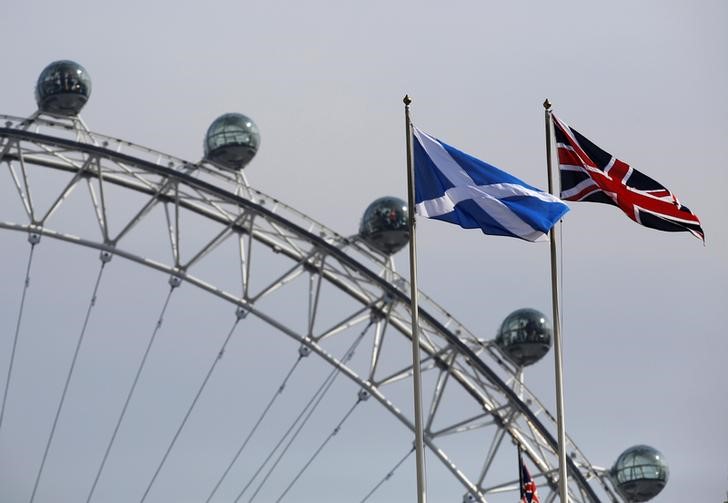By Guy Faulconbridge
LONDON (Reuters) - If Britain votes to leave the European Union in a referendum, Scottish nationalists would push for another independence vote as the world's fifth-largest economy grappled with exiting the EU, JPMorgan (NYSE:JPM) said in a research note.
Cameron, whose Conservative party won a surprise majority in a general election last month, has promised to renegotiate Britain's EU relationship and hold a referendum on membership by the end of 2017.
JPMorgan said Cameron would probably hold the referendum in 2016 and that he would not deliver substantive change in his renegotiation but that he would claim the relationship had been reset and win a referendum to stay in.
"Our base case is that the EU referendum will take place in the second half of 2016, and that the UK will vote to stay in," it said.
But the U.S. investment bank's analysts cautioned that economic uncertainty about the outcome could hurt the economy and that any vote to leave could trigger demands for a second independence referendum from the Scottish National Party (SNP).
"It is likely that the SNP would claim that the decision to exit should precipitate another referendum on independence for Scotland," JPMorgan analysts Malcolm Barr and Allan Monks said in the note to clients.
"The prospect of another referendum on Scottish independence
would add to the uncertainties facing the UK after a vote to
leave the EU," they added.
Scottish nationalists say they would like to hold another referendum eventually and have warned that if England votes to leave the EU but Scotland votes to stay, a constitutional crisis would follow.
Scotland voted 55-45 to preserve the United Kingdom in the Sept. 18 referendum last year.
A British exit, known as a Brexit, would take some time to implement after a vote to leave, JPMorgan said, adding that the uncertainty over an exit could hurt business sentiment, investment decisions and headline growth.
"That uncertainty could intensify following a vote to leave, given the lack of clarity about how Brexit would work in practice," it added.

"The transitional costs are likely to be substantial, as uncertainty over future arrangements would likely cause investment to fall and consumers to defer spending," said the bank, which has assets of $2.6 trillion.